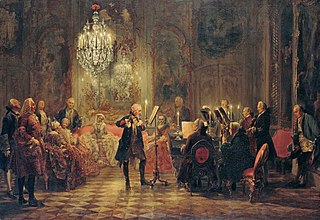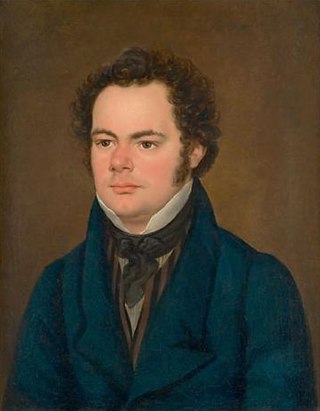
Isaac Stern was an American violinist.

The term string quartet refers to either a type of musical composition or a group of four people who play them. Many composers from the mid-18th century onwards wrote string quartets. The associated musical ensemble consists of two violinists, a violist, and a cellist. The double bass is almost never used in the ensemble mainly because it would sound too loud and heavy.

Chamber music is a form of classical music that is composed for a small group of instruments—traditionally a group that could fit in a palace chamber or a large room. Most broadly, it includes any art music that is performed by a small number of performers, with one performer to a part. However, by convention, it usually does not include solo instrument performances.
The Takács Quartet is a string quartet founded in Budapest, Hungary, and now based in Boulder, Colorado, United States.

The Emerson String Quartet, also known as the Emerson Quartet, was an American string quartet initially formed as a student group at the Juilliard School in 1976. It was named for American poet and philosopher Ralph Waldo Emerson and began touring professionally in 1976. The ensemble taught in residence at The Hartt School in the 1980s and is currently the quartet in residence at Stony Brook University. Both of the founding violinists studied with Oscar Shumsky at Juilliard, and the two alternated as first and second violinists for the group. The Emerson Quartet was one of the first such ensembles with the two violinists alternating chairs.
D major is a major scale based on D, consisting of the pitches D, E, F♯, G, A, B, and C♯. Its key signature has two sharps. The D major scale is:
A major is a major scale based on A, with the pitches A, B, C♯, D, E, F♯, and G♯. Its key signature has three sharps. Its relative minor is F-sharp minor and its parallel minor is A minor. The key of A major is the only key where the Neapolitan sixth chord on requires both a flat and a natural accidental.
E-flat major is a major scale based on E♭, consisting of the pitches E♭, F, G, A♭, B♭, C, and D. Its key signature has three flats. Its relative minor is C minor, and its parallel minor is E♭ minor,.
D minor is a minor scale based on D, consisting of the pitches D, E, F, G, A, B♭, and C. Its key signature has one flat. Its relative major is F major and its parallel major is D major.

Franz Schubert's final chamber work, the String Quintet in C major is sometimes called the "Cello Quintet" because it is scored for a standard string quartet plus an extra cello instead of the extra viola which is more usual in conventional string quintets. It was composed in 1828 and completed just two months before the composer's death. The first public performance of the piece did not occur until 1850, and publication occurred three years later in 1853. Schubert's only full-fledged string quintet, it has been praised as "sublime" or "extraordinary" and as possessing "bottomless pathos," and is generally regarded as Schubert's finest chamber work as well as one of the greatest compositions in all chamber music.
Discography for the cellist Yo-Yo Ma.
The Juno Award for Classical Album of the Year has been awarded since 1985, as recognition each year for the best classical music album in Canada. It was a split from the prior category for Juno Award for Classical Album of the Year, alongside a separate new category for Classical Album of the Year – Large Ensemble or Soloist with Large Ensemble Accompaniment.

Josef Suk was a Czech violinist, violist, chamber musician and conductor. In his home country he carried the title of National Artist.

Emanuel "Manny"Ax is a Grammy-winning American classical pianist. He is known for his chamber music collaborations with cellist Yo-Yo Ma and violinists Isaac Stern and Young Uck Kim, as well as his piano recitals and performances with major orchestras in the world.
Laszlo Varga was a Hungarian-born American cellist who had a worldwide status as a soloist, recording artist, and authoritative cello teacher.
The Spencer Dyke Quartet was a string quartet active in England through the 1920s. It was formed in 1918 and its personnel remained unchanged until August 1927 when Bernard Shore became the violist and Tate Gilder the second violin. It is best remembered now for a series of pioneering chamber music recordings made for the National Gramophonic Society. At the time of the recordings, the Quartet members were Edwin Spencer Dyke, Edwin Quaife, Ernest Tomlinson (viola) and Bertie Patterson Parker cello. Bernard Shore played viola in the last two recordings only.

Kenneth Slowik is an American cellist, viol player, and conductor. Curator of Musical Instrument Collection at the National Museum of American History and Artistic Director of the Smithsonian Chamber Music Society. He took an interest in music and organology from an early age. He studied at the University of Chicago, the Chicago Musical College, the Peabody Conservatory, the Salzburg Mozarteum and, as a Fulbright Scholar, the Vienna Hochschule für Musik, guided by Howard Mayer Brown, Nikolaus Harnoncourt, Antonio Janigro, Edward Lowinsky, and Frederik Prausnitz.

Wu Han (吴菡) is a Taiwanese-American pianist and influential figure in the classical music world. Leading a multifaceted career, she has risen to international prominence through her activities as a concert performer, recording artist, educator, arts administrator, and cultural entrepreneur. She is currently the Co-Artistic Director of the Chamber Music Society of Lincoln Center, and Music@Menlo Chamber Music Festival and Institute in California and Co-Founder of ArtistLed. She also serves as Artistic Advisor for Wolf Trap’s Chamber Music in the Barns series and the Society of the Four Arts in Palm Beach. She was appointed Artistic Director of La Musica in 2022.
Leonard Hokanson was an American pianist who achieved prominence in Europe as a soloist and chamber musician.









